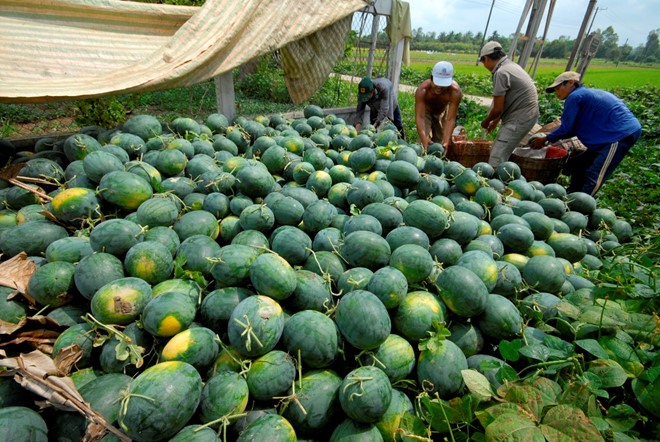 Economy
Economy

The Asia – Africa Market Department, under Ministry of Industry and Trade (MoIT), has made some recommendations for Vietnamese enterprises when exporting watermelons to China.
 |
| MoIT recommends that producers and exporters of agricultural products, fruits in general, watermelons in particular, cooperate actively with Chinese importers to study and comply with regulations on quality standards. — Photo news.zing.vn |
HÀ NỘI — The Asia – Africa Market Department, under Ministry of Industry and Trade (MoIT), has made some recommendations for Vietnamese enterprises when exporting watermelons to China.
According to the MoIT, watermelon cultivation area in China is currently about two million ha, 10 per cent of the total area of fruit and vegetable crops. Watermelon average output is about 73-75 million tonnes per year.
China Customs statistics showed that from 2014 to early 2018, China imported an average of more than 200,000 tonnes per year with a turnover of about US$30 million, but these figures are decreasing.
In 2017, China imported 188,300 tonnes of watermelons, worth $31.8 million, down 7.78 per cent in volume and 2.8 per cent in turnover compared to the previous year. Currently, besides Việt Nam, China also imports watermelons from Malaysia and Myanmar.
In terms of quality standards, agricultural and fruit exports to China need a certificate of inspection and quarantine issued by the exporting countries’ agency.
According to information from Việt Nam Trade Office branch in Nanning, Guangxi, China, customs departments in this locality have asked fruit importing firms in the area to change watermelon lining materials (Việt Nam mainly uses straw) during transport with non-harmful materials and no infectious organisms (such as porous mesh) from May 2019.
Since May 2018, China has improved its management and traceability of imported watermelons in particular and put traceability labels on imported fruit products. The list of planted gardens and packaging enterprises involved in the exports must be notified by the exporting countries’ management agency to the Chinese side.
To minimise risks and ensure sustainable exports to the Chinese market, the MoIT recommends producers and exporters of agricultural products work with Chinese importers to comply with regulations on quality standards, testing, quarantine, packaging and traceability.
If the fruit gardens and packing enterprises are not on the list posted by China Customs, Vietnamese enterprises should contact the Ministry of Agriculture and Rural Development for guidance. — VNS




